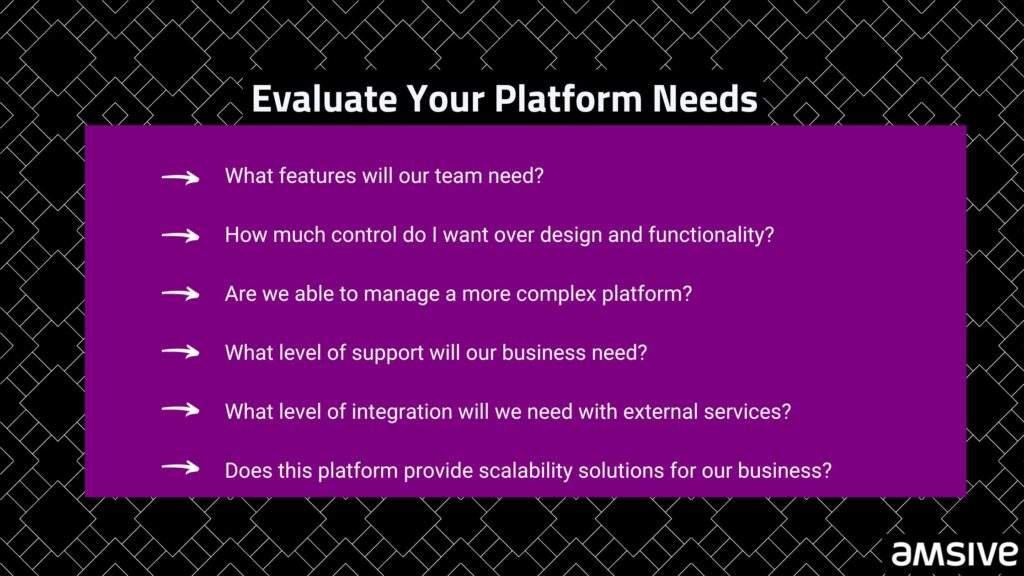One of the most significant decisions many B2B and D2C businesses must make is choosing the right eCommerce platform for their online stores. Gartner projected that by this year, at least 70% of enterprise marketplaces will serve B2B transactions. In 2021, D2C eCommerce sales in the United States exceeded $128 billion, with the market forecasted to grow to around $213 billion by the end of this year. There are a few great eCommerce platforms out there, but which is right for your business?
Let’s explore the advantages and challenges you may face when considering Shopify Plus, Adobe Commerce, and BigCommerce for your online business.
Jump To:
Finding a New Platform or Choosing to Replatform
What are the future needs of your business? Are you planning to scale your operations or move from one platform to another? Evaluating your platform goals is critical before you shift your business to a platform with different features and functionality. First, answer these questions:
- What features will our team need for our online store?
- How much control do I want our team to have over the design and functionality of our store?
- Are we able to manage a more complex platform?
- What level of support do we need for our eCommerce business?
- What is the level of integration with other external services?
- Does it provide any scalability solutions for growing businesses?
Remember these questions as you examine the features and benefits of the best eCommerce platforms.
Who else will be involved in this decision? It’s also critical to solicit stakeholder perspectives and ensure alignment in this decision-making process. Be sure to evaluate the needs of your respective stakeholders and prioritize their concerns while keeping the business’s goals in mind. Gathering input from stakeholders gives you a better understanding of what they expect from the platform and how it will impact them.

Comparing eCommerce Platforms: Shopify Plus, Adobe Commerce & BigCommerce
While every business varies, all online sellers have common overall goals. They want a tool that helps them manage their website, sales, marketing, and operations efficiently, conveniently, affordably, and seamlessly. Let’s examine three of the leading eCommerce platforms and why they may fit your business.
- Shopify Plus
- Adobe Commerce (formerly Magento)
- BigCommerce
To help prepare you for this business decision, we’ll analyze each platform’s strategic opportunities and challenges and provide recommendations.
Shopify Plus
An eCommerce platform that allows businesses to sell both online and offline across more than 100 social channels and through over 80 online marketplaces like Amazon and eBay, Shopify Plus sells its ability to scale and deliver to customers what they need to expand and thrive—all in a convenient, affordable, and timely manner.
With compelling features such as video, 3D, and AR available on product pages to boost conversions even further, Shopify Plus takes the consumer’s online experience to the next level. Meanwhile, behind the scenes, the platform offers businesses limitless development and sandbox environments for building and testing storefronts before they go live.
As your business grows, Shopify Plus grows with it. Unlimited staff accounts allow merchants to create multiple staff accounts and permissions, allowing more employees to manage inventory, make necessary updates and price changes, and more. However, none of this matters if your online store goes down. Luckily, with Shopify Plus, that’s hardly ever a concern, given its average 99.99% uptime.
The Advantages of Shopify Plus
Robust B2B and D2C Commerce
Shopify Plus supports integrated B2B and D2C models that allow businesses to manage wholesale and consumer purchases through separate or unified stores.
Fully Hosted SaaS
With its secure, highly scalable SaaS platform, Shopify Plus eliminates the need for more platform upgrades and saves you money on web hosting fees.
Global Expansion
Businesses can use the platform’s robust themes to create tailored, international brand experiences.
Expansive Apps
Shopify Plus allows you to easily integrate an ecosystem of apps, plugging into what businesses need.
Multichannel Integration
Sell through dozens of online marketplaces, over 100 social channels, mobile interfaces, and more through sales channels like Amazon, Instagram, Facebook, eBay, Pinterest, and other integrations.
A Potential Shopify Plus Drawback
Customization
Compared to other eCommerce sites, Shopify Plus has less design freedom and opportunities to customize your eCommerce store. To make significant changes to your Shopify site, you’ll need to learn the in-house coding language that Shopify utilizes: Liquid. This can make the customization process more time-consuming and resource-intensive.
Why Shopify Plus is the Best Platform for Scale
Shopify Plus is built to create stores optimized for your business, reach customers, convert checkouts, and scale quickly. The platform accomplishes this through:
- An easy-to-use system
- Built-in security, compliance, data encryption, and fraud and bot protection
- Industry-leading uptime
- Convenient automation
- An expansive App Marketplace
- A mobile-optimized online store with unlimited bandwidth and web hosting
- Data and insights with detailed reporting across all your stores
If you’re looking to grow into an enterprise operation that sells thousands of products daily, Shopify Plus can seamlessly handle the transition and volume and grow as your business grows.
If you’re already a large retailer, Shopify Plus can save you time and money with features like Launchpad, a command center for flagship sales events like product launches and flash sales that allows you to plan what’s being launched as well as inventory, pricing, and theme personalizations ahead of the big event; and Shopify Flow, which saves you valuable time by automating previously manual (and tedious) tasks, such as customizing inventory and order operations.
Shopify Plus is also ideal if you’re planning on expanding your business internationally and are seeking an authentic branded experience for customers. Considering these features and factors, Shopify Plus is a reliable eCommerce platform that serves B2B and D2C businesses exceptionally well.
Adobe Commerce (formerly Magento)
While an effective eCommerce platform for B2C models, Adobe Commerce (formerly Magento) hinges on its robust B2B capabilities. Adobe Commerce offers businesses an efficient digital experience heavy on built-in features specifically created for B2B commerce. It also provides incredible results—businesses that switched from Magento Open-Source to Adobe Commerce reported an average ROI of 165.3% after three years.

As consumer demand for personalization ramps up in the coming year, Adobe Commerce can deliver the hyper-personalized brand experiences that more and more Americans are craving.
The Advantages of Adobe Commerce
B2B eCommerce Solutions
The B2B module expands Adobe Commerce into a flexible B2B platform ideal for manufacturers, distributors, and wholesalers. Best of all, it can be customized to fit your specific business needs.
B2C eCommerce Solutions
Meet growing consumer demands for the highest-quality multichannel experiences. Adobe Commerce can be leveraged to build unique customer journeys that play to your company’s strengths.
End-to-End Solutions
Adobe Commerce offers start-to-finish eCommerce solutions, including development, integrations, and more.
Sophisticated Search
Powerful built-in or customizable search ensures customers find products instantly.
A Potential Drawback of Adobe Commerce
Learning Curve
While not alone in this regard among other eCommerce platforms, Adobe Commerce can be complex for internal teams to learn. Because of its many features (a definite plus!), there may be a steeper learning curve than other platforms.
Why Adobe Commerce is the Best B2B Solution
When it comes to B2B platforms, Adobe Commerce hits the mark. The platform has already demonstrated in a test of its B2C and B2B capabilities based on simulated day-to-day store activities and realistic customer transaction volumes that it can easily accommodate enterprise businesses. And while it’s perfectly capable of handling a B2C business of any size, Adobe Commerce’s B2B eCommerce platform is tough to top. Designed for B2B buyers and scalable from small to enterprise businesses, Adobe Commerce offers:
- Unrivaled flexibility to build complex, custom stores that scale
- Personalized buying experiences with customer-specific catalogs and pricing, as well as targeted content and promotions
- Quick order forms and the ability to upload lists of SKUs, create saved shopping lists, or request quotes
- Seller-assisted shopping that lets you place orders on behalf of customers
- Integrated customer quoting and price-negotiation capabilities
- Flexibility to sell digital products, subscriptions, and services
- Ability to manage B2B and B2C businesses and sell to multiple brands in several locations
- Features like quick checkout, product recommendations, inventory management, and more
If you’re a B2B brand, Adobe Commerce has the complete toolbox. Through its self-service customer portal, businesses can create buyer tiers and assign them roles and permissions, track orders and quotes, manage credit online, personalize the buying experience with customer-specific pricing and catalogs, and target particular customers with personalized content and promotions. And that’s just scratching the surface. If you’re in B2B, Adobe Commerce is a platform that can support your business goals.
BigCommerce
With a convenient Multi-Storefront feature that allows businesses to create more than one store under a single subscription, BigCommerce offers flexibility and versatility that some competitors can’t match. Its all-in-one platform provides everything a merchant needs—a product database, web hosting, inventory management, shipping calculations, a marketing toolbox, and more. That alone can save your business money since you won’t have to purchase as many third-party apps. BigCommerce is also equally suited to small businesses and enterprise operations.
In our view, it’s the personalized eCommerce aspect that BigCommerce does especially well, and it all goes back to its Multi-Storefront capabilities. Across each storefront, B2B and B2C businesses can customize themes, widgets, and social links and pages, personalize emails and manage newsletter subscriptions, set and change the default currency, connect a distinct domain, and build custom pricing with price lists and customer groups.
The Advantages of BigCommerce
Serves Hybrid Business Customers
BigCommerce enables seamless, unified commerce on one intuitive platform, allowing stores to sell easily to businesses and consumers.
Multi-Website Capability
As we mentioned, BigCommerce’s Multi-Storefront feature allows businesses with multiple brands or different customer segments to store multiple front-ends on one back-end. Multi-brand companies benefit from this flexibility as each storefront can have a unique domain, theme, categories, and more.
SaaS Platform
BigCommerce’s fully hosted SaaS model provides powerful functionality without technical debt, eliminating the headaches that come with hosting.
SEO Advantages
Built-in SEO maximizes discoverability, and BigCommerce offers search-optimized themes, URLs, sitemaps, and customizable product metadata. Their suite of powerful SEO tools provides a significant advantage over competitors’ platforms.
Secure and Scalable
BigCommerce’s impressive uptime, security, and PCI compliance places your company’s focus on business growth rather than technical issues.
Global Expansion
With support for multiple currencies, languages, global CDN, and fulfillment like ShipperHQ, BigCommerce is an ideal eCommerce platform for international businesses.
Multi-Location Inventory
A must-have for larger enterprises, this feature allows big companies to manage inventory across multiple warehouses for faster fulfillment.
A Potential Drawback of BigCommerce
Templates
Although BigCommerce has several available free themes, many of the designs look similar to one another. These free themes also offer a minimal number of typefaces, making them less customizable than some other eComm platforms.
The Best Platform for Hybrid Businesses
The platform’s versatility offers businesses opportunities to:
- Seamlessly create unique storefronts for each piece of the business, all managed through a single dashboard
- Expand into new markets with customized storefronts
- Streamline operations—and reduce costs—by minimizing the amount of integrations and systems within your current operation
- Eliminate redundancies by managing all of your storefronts through one system
- Personalize B2B experiences and buying tiers
- Expedite invoicing and payment processing
- Effortlessly manage past quotes and order histories
If your business is both B2B and D2C, offers an expansive inventory or catalog, requires multiple storefronts, or sells internationally, BigCommerce is an outstanding platform for your needs.
Take the Next Step
Overall, when determining which eCommerce platform to use or re-platform, consider your business goals beyond the platform you choose. Look at your business plan, brand strategy design goals, and scalability plans. What do you value the most? Is it the ability to run or maintain a hybrid business model? Do you want a platform that allows you to customize your page quickly? Do you plan on expanding to a multi-storefront structure?
Once you’ve identified your priorities and discussed your position with key stakeholders and team members, let us help you make the most of our full-service eCommerce solutions. Dig more deeply into common eCommerce SEO mistakes and how to avoid them, or let’s talk about achieving more for your marketing — and your business.







